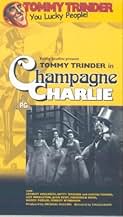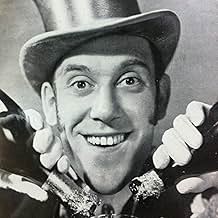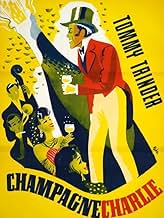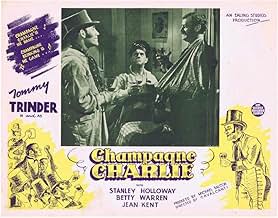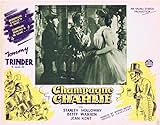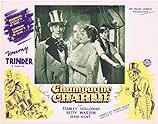The story of a 19th century English music hall performer and life behind the scenes.The story of a 19th century English music hall performer and life behind the scenes.The story of a 19th century English music hall performer and life behind the scenes.
- Director
- Writers
- Stars
Bill Shine
- Mogador Stage Manager
- (as Billy Shine)
Andreas Malandrinos
- Gatti
- (as Andrea Malandrinos)
Peter De Greef
- Lord Petersfield (His Son)
- (as Peter De Greeff)
- Director
- Writers
- All cast & crew
- Production, box office & more at IMDbPro
Featured reviews
Nostalgia is everything it's cracked up to be in Champagne Charlie, a valentine from Ealing Studios and Alberto Cavalcanti to English music halls. Ostensibly, it's the story of George Leybourne (Tommy Trinder) and his rivalry with Alfred Vance, the Great Vance (Stanley Holloway), in the music halls of mid-Victorian England. The music halls hadn't yet become the more respectable theaters of England, from which they lasted in full glory until television appeared. In the 1860s they usually were big ale houses, unsophisticated drinking and singing establishments for the working man and his lady. In this movie's view, they were often rambunctious, loud, jolly and great fun, where the swells often showed up to see the latest entertainment, which included young dancers, and everyone joined in the songs. There's a smattering of a plot beyond the rivalry (which includes a ludicrous duel at one point between the equally nervous Leybourne and Vance) involving attempts to close the music halls down and a romance between a duke's son and the daughter of Bessie Bellwood (Betty Warren), a music hall owner and singer who employs Leybourne.
The interest is in the the story of Leybourne, who becomes Champagne Charlie. He's played with enthusiasm and great cheer by Tommy Trinder, who was a hugely popular stage and later radio entertainer in the Thirties, Forties and Fifties. Trinder was a tall Cockney with a long face, round eyes, a lot of teeth and personality to spare. The first 50 minutes of the movie, in fact, is largely Trinder and Holloway performing song after song in the gas-lit music halls, always strutting their best stuff as they try to out-perform each other with drinking songs and stage power. It's a grand show, with the ale flowing, the smoky atmosphere, crowds of warm bodies having a great time...it's good cheer all around even with the plot. Hearing and seeing Trinder prance about performing Champagne Charlie; Hit Him on the Boko; Ale Old Ale; Burgundy, Claret and Port; I'm One of the Brandy and Seltzer Boys; and Everything Will Be Lovely...or hearing and seeing Holloway sell Strolling in the Park; I Do Like a Little Drop of Gin; Rum, Rum, Rum; A Glass of Sherry Wine; and Hunting After Dark...is to wish you were back there, too, downing a pint and singing with them.
If it had been possible in war-time Britain for this movie to have been made in Technicolor, Champagne Charlie would not be the forgotten museum piece it has become. The settings in the music halls cry out for lush color. For those who love English music halls, try Lost Empires. It's a multi-part TV miniseries from 1986 based on the novel by J. B. Priestly. It tells the story of Richard Herndon, played by Colin Firth, who joins his uncle for a year of touring on the Empire music hall circuit before WWI starts. Lawrence Olivier in his next to last theatrical appearance plays an aging song-and-dance man long past his prime. Lost Empires is a fine drama which expertly recreates the atmosphere and the acts.
The interest is in the the story of Leybourne, who becomes Champagne Charlie. He's played with enthusiasm and great cheer by Tommy Trinder, who was a hugely popular stage and later radio entertainer in the Thirties, Forties and Fifties. Trinder was a tall Cockney with a long face, round eyes, a lot of teeth and personality to spare. The first 50 minutes of the movie, in fact, is largely Trinder and Holloway performing song after song in the gas-lit music halls, always strutting their best stuff as they try to out-perform each other with drinking songs and stage power. It's a grand show, with the ale flowing, the smoky atmosphere, crowds of warm bodies having a great time...it's good cheer all around even with the plot. Hearing and seeing Trinder prance about performing Champagne Charlie; Hit Him on the Boko; Ale Old Ale; Burgundy, Claret and Port; I'm One of the Brandy and Seltzer Boys; and Everything Will Be Lovely...or hearing and seeing Holloway sell Strolling in the Park; I Do Like a Little Drop of Gin; Rum, Rum, Rum; A Glass of Sherry Wine; and Hunting After Dark...is to wish you were back there, too, downing a pint and singing with them.
If it had been possible in war-time Britain for this movie to have been made in Technicolor, Champagne Charlie would not be the forgotten museum piece it has become. The settings in the music halls cry out for lush color. For those who love English music halls, try Lost Empires. It's a multi-part TV miniseries from 1986 based on the novel by J. B. Priestly. It tells the story of Richard Herndon, played by Colin Firth, who joins his uncle for a year of touring on the Empire music hall circuit before WWI starts. Lawrence Olivier in his next to last theatrical appearance plays an aging song-and-dance man long past his prime. Lost Empires is a fine drama which expertly recreates the atmosphere and the acts.
This must be the first time since the nineteenth century that the audience for a show could be heard to leave the building still humming 'Champagne Charlie' :-) (In fact, I did wonder if we were going to get some audience participation at one point -- I was on the verge of it myself -- and am curious as to whether sing-alongs ever happened during the original screenings.) This is a wonderful experience, with Tommy Trinder clearly in his element as music-hall entertainer George Leybourne: his singing voice clearly doesn't equal that of Stanley Holloway, but he can put over the songs so well that you can credit him as a serious competitor... if one can ever describe either of these two as 'serious'! Betty Warren is magnificent in every sense of the word, the very image (and figure) of a Victorian stage star, brimming with coquetry, charisma and sound business sense, and it's a pity that the only number featuring these three together gives her so little to do. A host of minor, unnamed but recurring characters bring the genial, raucous world of the music hall to life, with its flickering stage flares, its haze of smoke and its plentiful supply of drink.
But the true stars of the picture are surely the composers and lyricists who contributed the host of songs that enliven the soundtrack, the new music fitting seamlessly with such genuine period hits as "Champagne Charlie" and "The Daring Young Man on the Flying Trapeze". The plot requires the rival stars to cap one another with song after song on the theme of alcohol, every one of which has to be a credible smash hit: with writers like Billy Mayerl and Noel Gay involved, plus the bravura delivery of the two vocalists, the audience both offscreen and on are completely convinced.
But the true stars of the picture are surely the composers and lyricists who contributed the host of songs that enliven the soundtrack, the new music fitting seamlessly with such genuine period hits as "Champagne Charlie" and "The Daring Young Man on the Flying Trapeze". The plot requires the rival stars to cap one another with song after song on the theme of alcohol, every one of which has to be a credible smash hit: with writers like Billy Mayerl and Noel Gay involved, plus the bravura delivery of the two vocalists, the audience both offscreen and on are completely convinced.
every time i watch this film i find it plain amazing. It's a light entertainment of the highest class. The music and the performance are superb, i always catch myself humming the tunes afterward. Surely the best of the film are Tommy Trinder and Stanley Holloway, but it's also the finest performance of Betty Warren. I assume that the ale-houses, as they are shown in the film, would be an origin of the karaoke evenings in our age. I also like the tiny hint to the Andersen's tale, when the mother and the daughter are admiring a mechanical toy. it's a shame that Cavalcanti left England so soon after making this film. He was like a rising star on the cinematic firmament, and he let the actors do their best. Enjoy it!
The rivalry between George Laybourne and The Great Vance in the music hall era.
I enjoyed this for its affectionate look into a bygone era of British culture, it's amusing characters and impressive set pieces.
The plot is a character-driven and fairly nonintrusive excuse to show a number of musical hall sequences and songs relating to the era. It is very much a film of two halves, with the rivalry between the two great musical hall stars in the first half and the struggle to keep the musical halls open taking focus in the second. A sub-plot involves a fairly uninspired romance.
There are a number of pub and musical hall set-pieces that work very well to capture the tone of the movie and it's subject matter. I found all these scenes highly entertaining. I try to imagine myself watching this in 1944 when the world was in devastation and in need of some positive escapism. It hardly feels authentic Victorian Britain, bit it certainly makes you want to go out, have a few drinks and enjoy yourself in a crowd of friends.
The songs are all good fun but pretty forgettable in the grand scheme of movie music. For me it's all the social settings, high energy, humour and enthusiasm that give it charm.
Performances are mixed, with charismatic stars Tommy Trinder and Stanley Holloway excellent as the above mentioned protagonists, but for me its Betty Warren who holds it altogether with a quite dominant turn as Bessie Bellwood. Most supporting roles are fairly uninspired, however Jean Kent does have a certain presence Dolly.
It's remarkable when you consider that this era depicts entertainment that predates radio broadcasting. Outside of church, this would have been a victorian equivalent of screen time. You look around at the world now and marvel at how much investment and technology has gone into providing people with that continual fix in the palm of their hand.
For me its 6.5/10, but I round upwards.
I enjoyed this for its affectionate look into a bygone era of British culture, it's amusing characters and impressive set pieces.
The plot is a character-driven and fairly nonintrusive excuse to show a number of musical hall sequences and songs relating to the era. It is very much a film of two halves, with the rivalry between the two great musical hall stars in the first half and the struggle to keep the musical halls open taking focus in the second. A sub-plot involves a fairly uninspired romance.
There are a number of pub and musical hall set-pieces that work very well to capture the tone of the movie and it's subject matter. I found all these scenes highly entertaining. I try to imagine myself watching this in 1944 when the world was in devastation and in need of some positive escapism. It hardly feels authentic Victorian Britain, bit it certainly makes you want to go out, have a few drinks and enjoy yourself in a crowd of friends.
The songs are all good fun but pretty forgettable in the grand scheme of movie music. For me it's all the social settings, high energy, humour and enthusiasm that give it charm.
Performances are mixed, with charismatic stars Tommy Trinder and Stanley Holloway excellent as the above mentioned protagonists, but for me its Betty Warren who holds it altogether with a quite dominant turn as Bessie Bellwood. Most supporting roles are fairly uninspired, however Jean Kent does have a certain presence Dolly.
It's remarkable when you consider that this era depicts entertainment that predates radio broadcasting. Outside of church, this would have been a victorian equivalent of screen time. You look around at the world now and marvel at how much investment and technology has gone into providing people with that continual fix in the palm of their hand.
For me its 6.5/10, but I round upwards.
This is based on the life of music hall star George Laybourne, tracking his rise from singing in pubs to becoming one of the top entertainers of his day. Although the competition over who had the better drinking song between Laybourne and rival The Great Vance (Stanley Holloway, obviously thoroughly relishing the role) did supposedly take place, the film isn't overly accurate historically and does skim over detail somewhat. On the positive side, this does make room for more songs and the film packs in plenty with the numbers being infectiously catchy and marvellously well delivered. Sadly, this seems to be a somewhat forgotten Ealing film, which is a shame as it gives excellent insight into a decidedly odd, but enjoyable looking form of particularly British entertainment now consigned to history.
Did you know
- TriviaFilm debut of Hazel Court, who had one line of dialogue.
- Crazy creditsOpening credits prologue: In the year of Grace 1860, two brothers set out from the mining village of Leybourne for London Town . . . .
- ConnectionsFeatured in Those British Faces: A Tribute to Stanley Holloway 1890-1982 (1993)
- SoundtracksThe Man on the Flying Trapeze
(uncredited)
Music by Alfred Lee
Lyrics by George Leybourne
Arranged by Ernest Irving
Details
- Runtime
- 1h 45m(105 min)
- Color
- Aspect ratio
- 1.37 : 1
Contribute to this page
Suggest an edit or add missing content

